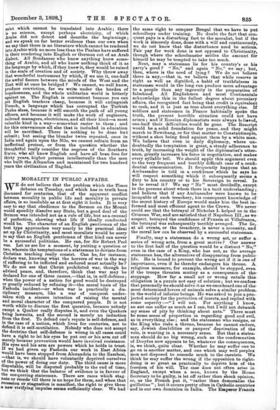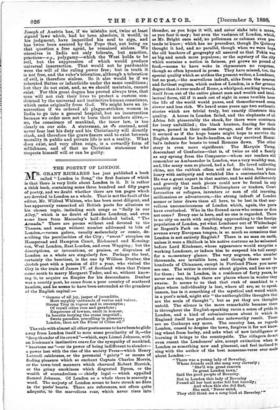MORALITY IN PUBLIC AFFAIRS.
WE do not believe that the problem which the Times debates on Tuesday, and which has in truth been discussed for centuries, that of the apparent conflict between morality in public life and morality in private affairs, is so insoluble as at first sight it looks. It is very easy to say that obedience to the Sermon on the Mount would speedily dissolve any State, but a good deal of the Sermon was intended not as a rule of life, but as a counsel of perfection, showing what life if ideally conducted would be. The character of an English gentleman of the best type approaches very nearly to the practical ideal set up by Christianity, and moat moralists would be sorry to say that an English gentleman of that kind can never be a successful politician. He can, for Sir Robert Peel wee. Let us see for a moment, by putting a question or two, wherein the temptations of a statesman to deviate from Christian teaching really consist. Can he, for instance, declare war, knowing what the horrors of war in the way of suffering to be inflicted and endured must actually be ? We do not see that Christ prohibited war, though he advised peace, and, therefore, think that war may be declared for one of three causes,—that is, in self-defence; when the power of a nation for good would be destroyed or greatly reduced by refusing it—the moral basis of the Fashoda incident—or when war is practically a dis- ciplinary measure, like a war of conquest under- taken with a sincere intention of raising the mental and moral character of the conquered people. It is not worth while to discuss the first question, because nobody except a Quaker really disputes it, and even the Quakers bring lawsuits, and the second is merely an induction from the first. To defend one's repute is self-defence, and in the case of a nation, which lives for centuries, not to defend it is self-mutilation. Nobody who does not accept the doctrine that self-defence is wrong in all cases could have a right to let his eyes be put out or his arm cut off merely because prevention would have involved resistance. His eyes and his arm are powers which he holds in trust. If we had given up Fashoda our work in East Africa would have been stopped from Alexandria to the Zambesi, —that is, we should have voluntarily deprived ourselves of the power of doing our duty. The third cause is more disputable, will be disputed probably to the end of time, but we think that the balance of evidence is in favour of the conquering statesman. There are races which stag- nate or recede till there is no hope for them, and when that recession or stagnation is manifest, the right to give them a new vivifying impulse seems sufficiently clear. We had the same right to conquer Bengal that we have to putt schoolboys under training. No doubt the fact that con- quest pays is a disturbing fact to the moralist, but if the work is sincerely done, done with a will and continuously, we do not know that the disturbance need be serious. Fair pay for work done is not opposed to Christianity, though where the schoolmaster settles the amount for himself he may be tempted to take too much.
Next, may a statesman lie for his country's or his party's good ? " No," and again " No," we say ; but, then, where is the need of lying ? We do not believe there is any,—that is, we believe that while reserve is right as well as dignified, a habit of truthfulness in statesmen would in the long run produce more advantage to a people than any ingenuity in the preparation of falsehood. All Englishmen and most Continentals acknowledge this in the fullest degree about pecuniary affairs, the recognised fact being that credit is equivalent to cash, and it is just as true about everything else. If soldiers and statesmen in France habitually spoke the truth, the present horrible situation could not have arisen ; and if Russian diplomatists were always believed, one-half their difficulties would be gone. The Rescript would be a solid foundation for peace, and they might march to Newchang, or for that matter to Constantinople, without a shot being fired against them by a white man. We believe that even in daily diplomacy, where un- doubtedly the temptation is great, a steady adherence to truth, by increasing the weight of the diplomatist's utter- ance, greatly increases his force in negotiation, and makes• every syllable tell. We should apply this argument even to the very frequent and terribly difficult case of a confi- dential communication. It frequently happens that an Ambassador is told in a confidence which he says he- will respect something which it subsequently seems a duty to his country or to his Sovereign to reveal. Is. he to reveal it ? We say " No " most decidedly, except to the persons about whom there is a tacit understanding ;. and believe that if any Ambassador were known to be incapable of such treachery, his consequent knowledge of the secret history of Europe would make him the best in- formed and most efficient agent to the Crown. We never could see that the betrayal of Nicholas I. helped us in the • Crimean War, and are satisfied that if Napoleon III., as we suspect, betrayed the confidence of Prussia at Villafranca,. the betrayal was subsequently terribly avenged. The lie,. at all events, or the treachery, is never a necessity, and the moral law can be observed by a successful statesman.
Finally, may a statesman do a wrong act, or suffer a series of wrong acts, from a great motive ? Our answer to the first half of the question would be a distinct " No," even in the case of a King, who has not, as the average statesman has, the alternative of disappearing from public life. He is bound to prevent the wrong act if it is one of importance, even if he thereby endangers his throne. A. religious massacre, for example, should be stopped, even if the troops threaten mutiny as a consequence of the-- stoppage. How far a small act or wrong entails this obligation is a puzzle not easy of solution ; but we confess, that personally we should solve it as we once heard one of the- most determined lovers of animals solve a similar problem.- in the world of inferior beings. He was asked to join a pro-. jetted society for the protection of insects, and replied with some asperity :—" I will not. For anything I know, an ant can suffer as much as I can, but I will not debauch my sense of pity by thinking about ants." There must be some sense of proportion in regarding good and evil, as in everything else ; and the statesman who resigns, or the King who risks a throne, because he cannot endure, say, Jewish disabilities or paupers' deprivation of the vote, is wanting in a necessary sense. But that a states- man should do no big wrong, such as the condemnation of Dreyfus now appears to be, whatever the consequences, is, we think, quite clear. Whether he may suffer one to go on is another matter, and one which may well perplex men not disposed to concede much to the casuists. We think he may suffer the wrong if the opposition to right- doing is so great as practically to deprive him of the freedom of his will. The case does not often arise in England, except when a man, known by the Home Secretary to be guilty, is let off rather than shock opinion, or, as the French put it, "rather than demoralise the guillotine " ; but it occurs pretty often in Catholic countries and in our own dominion in India. The Emperor Francis Joseph of Austria has, if we mistake not, twice at least signed laws which, had he been absolute, it would, in his judgment, have imperilled his soul to sign, and has twice been assured by the Pope that, not being on that question a free agent, he' remained sinless. We ourselves in India not only tolerate, but sanction, practices—e.g., polygamy—which the West holds to be evil, but the suppression of which would produce universal insurrection. That would not be pardonable were the will of the ruling power free ; but in truth it is not free, and the ruler's toleration, although a toleration of evil, is therefore sinless. So it also would be if we tolerated Suttee or infanticide under the same conditions ; but they do not exist, and, as we should maintain, cannot exist. For this great dogma has proved always true, that men will not risk their lives to protect a custom con- demned by the universal and instinctive human conscience, which came originally from God. We might have an in- surrection if we ordered all plague-stricken women in India to go into a general hospital, but an insurrection because we order men not to burn their mothers alive,— no, the conscience of mankind, the inner law, is too dearly on our side. A statesman, as w•e contend, need never fear lest his duty and his Christianity will directly clash, and therefore the grave fissure said to exist between morality it public and private life is not a reality. What -does exist, and very often reign, is a cowardly form of selfishness, and of that no Christian statesman who respects himself will or can be guilty.























































 Previous page
Previous page